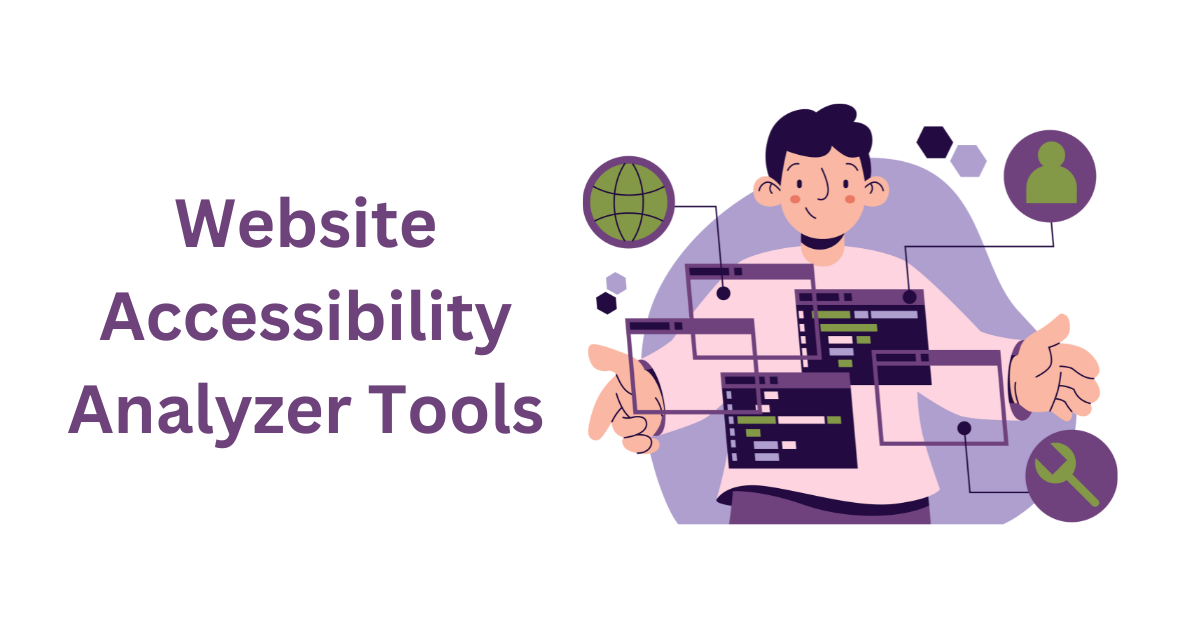With an increasing number of businesses showing up online, the need for accessibility analyser tools has been ever-high. Website Testing Tools are handy when you are looking to meet global accessibility standards. Since website accessibility is a subset of usability, ensuring websites are accessible is more necessary than just an option. Now, since there is a plethora of website accessibility tools available on the web, picking the right one might be a challenging decision. This blog will list some of the best and free web-based website accessibility analyzer tools. All these tools are capable and can evaluate your website against accessibility guidelines like WCAG 1.0 and 2.0, W3C Section 508, Italian Stanca Act, BITV (Accessibility Test of the German BIK Project), RGAA(French Accessibility Guidelines) and more.
What You Need to Know?
Before we reveal the names of the top free website accessibility analyzer tools, it is important to note that no evaluation tool can replace humans. This is because, at the current level of technology, it is almost impossible to emulate human attributes. Having that said, it is important to use these tools with caution. The results you obtain should be interpreted in context with the website you are evaluating. Finally, as already discussed, accessibility is a subset of usability, therefore, these tools should only be used to evaluate accessibility, as they can only show you where your site is inaccessible.
8 Best Free Website Accessibility Analyzer Tools
Honorary Mentions
- Intent-Based Accessibility Tracker
- AChecker Accessibility Checker
- Accessibility Analyzer
- Color Oracle
- TAW- Test de Accessibilidad Web
- Google Lighthouse
- Sa11y
- WAVE- Web Accessibility Versatile Evaluator
Intent-Based Accessibility Tracker
Ensuring website accessibility on Intent-based accessibility checker is a breeze. The accessibility checker does the hard work of scanning your website’s code and identifying accessibility-related deficiencies online. All you need to do is type your website’s live URL and choose the legislation pertinent to your country. Once you hit the Audit button, the tool will analyse your website comprehensively and fetch you a detailed and accurate audit report including elaborate explanations and recommended solutions to any issues that might be there.
AChecker Accessibility Checker
This tool is an open-source accessibility analyser introduced in 2009 by the Inclusive Design Research Centre of the University of Toronto. You can submit a webpage via its URL or the HTML file and select which guidelines to filter it through. You will be presented with a detailed audit report that contains issues as well as recommendations on how to resolve them.
Accessibility Analyzer
If you are looking for a comprehensive website testing tool that follows the latest accessibility guidelines and caters to global standards, this one is to go for. The Accessibility Analyzer is an open-source testing tool that scans your website and webpages for potential accessibility issues and provides valuable insights into non-functional code that may cause issues in the future. The testing tool is based on the WCAG 2.2 guidelines and can access webpages both offline and online. The tool can also be accessed through the developer toolbar and facilitates easier understanding with fewer user interactions.
Color Oracle
Color Oracle is an open-source website accessibility checker, available on GitHub for Mac, Linux and Windows computers. This tool is specifically for web designers, taking the guesswork out of designing for people who are color blind. It shows you what people with common color vision impairments will see, in real time. The tool is developed by Bernie Jenny of Monash University in Australia.
The tool simulates various forms of color blindness by adding a full-screen filter throughout your OS. If the design passes these filters, you can know that the website will easily be readable by those with minor color blindness.
TAW- Test de Accessibilidad Web
The TAW Accessibility Analyser tool is developed by the CTIC Centro Tecnologico and can help you identify the accessibility violations that it discovers over time. It does this by providing an annotated version of the website as well as recommendations on how to resolve these issues. Available both online and offline, the website testing tool can also be used as a Firefox add-on.
Read: Quick Guide on Hyper Virtual Machine Management Service
Google Lighthouse
Number 6 on our list, the Google developed Lighthouse, is again open-source and is an automated tool for improving the performance, quality and correctness of your web apps. The tool works by running a barrage of tests on the page and then generates a report on the performance. You can then use the failing tests as indicators on what you can do to improve the app.
Sa11y
This tool is a free tool that can help mark potential errors on the webpage and provide suggestions on how to remove the same. The tool is best for content authors and works best with a CMS. Sa11y can help identify common accessibility-related issues like incorrect headings, missing image descriptions, incorrect/ineffective hyperlink text, data tables lacking table headers, and insufficient contrast, etc.
WAVE- Web Accessibility Versatile Evaluator
Wave is another free, and community-built tool that facilitates web accessibility testing by providing you with a visual representation of issues on their page. The tests performed by this tool can access a ton of accessibility issues, that range from color contrast to ARIA Attributes. These tests are based on compliance standards from the WCAG and Section 508. This web-based accessibility tool can help evaluate your web content after CSS has been applied but fails to evaluate the Javascript sources. If you have a website with a lot of dynamic content from scripts, consider opting for Wave Chrome Extension as your go-to website accessibility analyzer tool.
Author’s Bio:
Peter serves as a technical writer at Accessibility Analyzer and has been closely following the web development landscape for more than 3 years now. He’s also been writing on web design and other technical topics.


